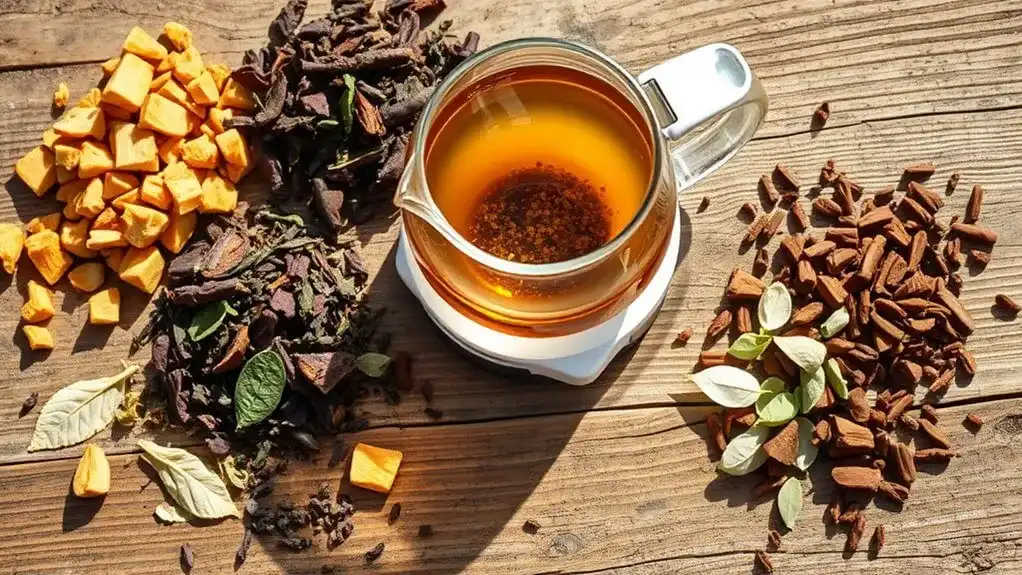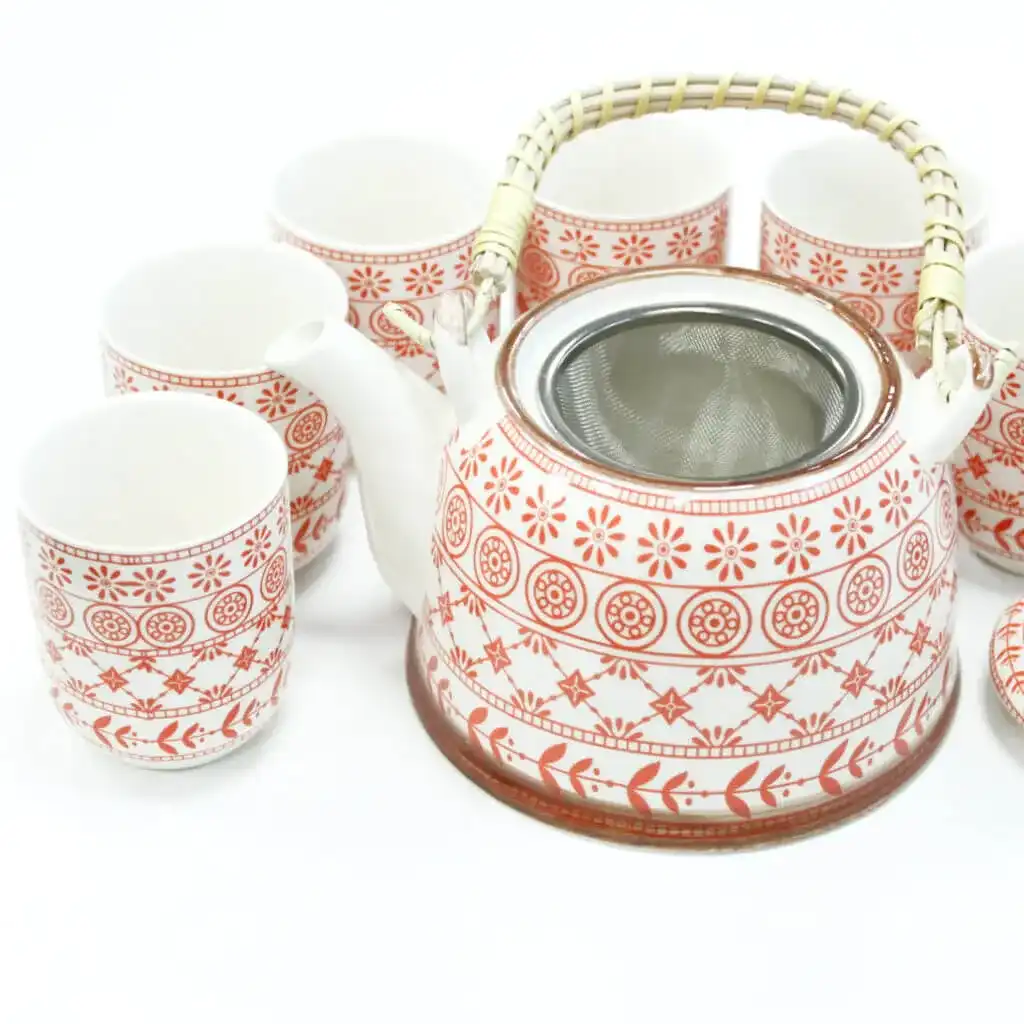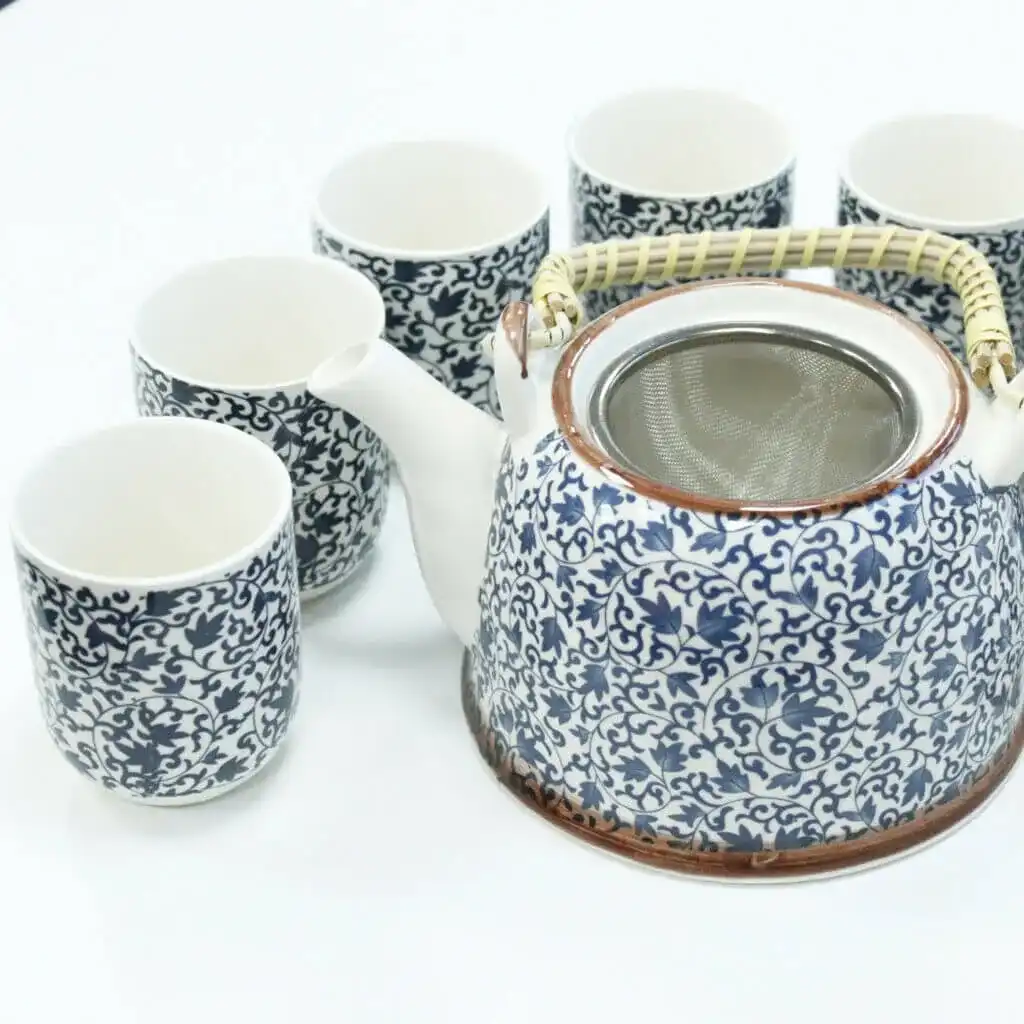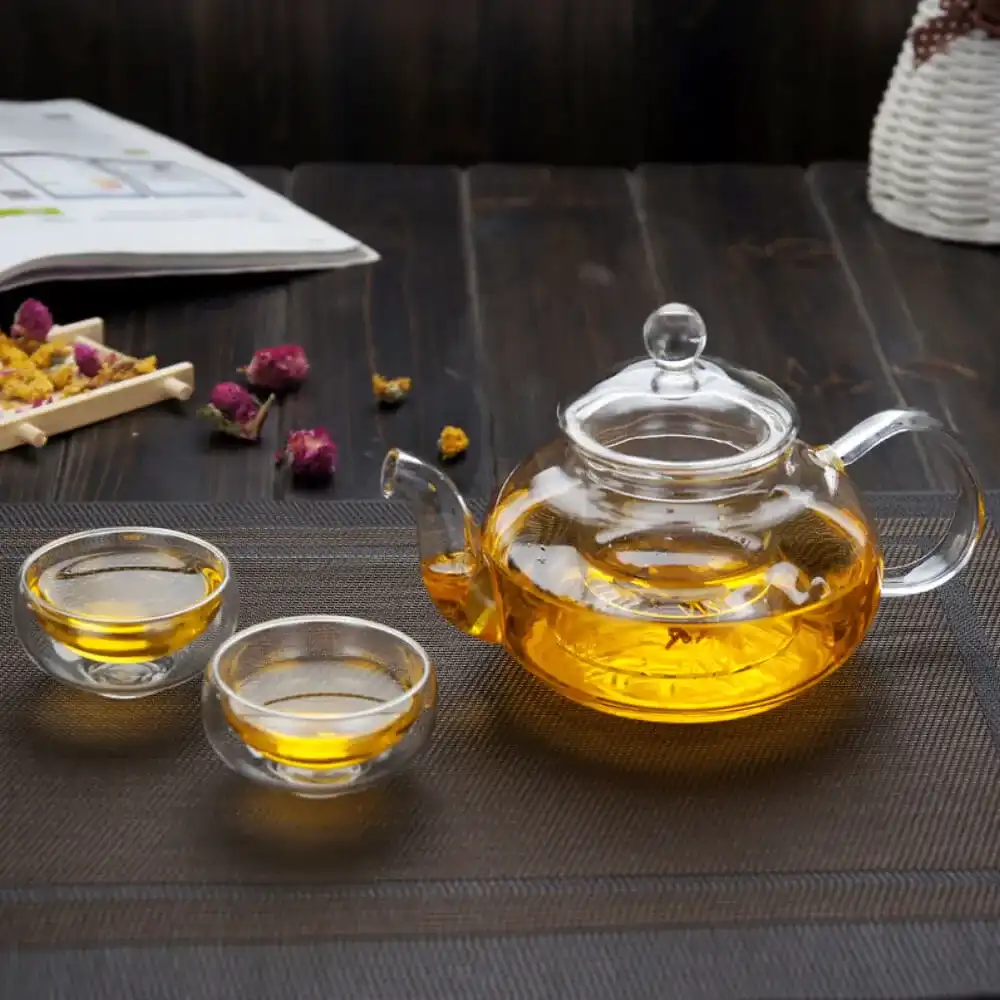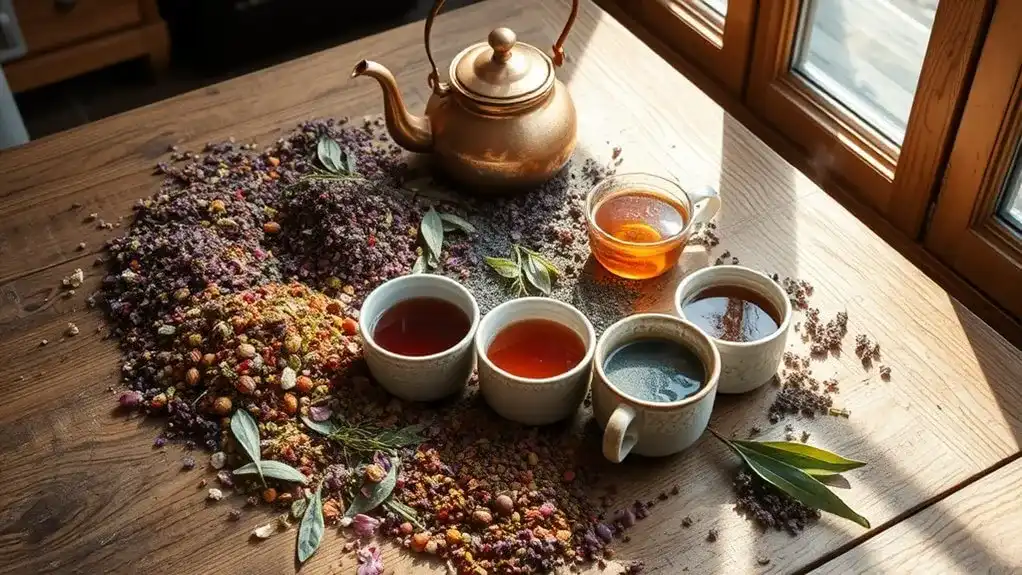Adaptogenic herbs in tea have shown promising stress-reducing benefits backed by scientific research, particularly for herbs like ashwagandha and tulsi. While the $1.3 billion market includes many legitimate products, consumers should be wary of unsubstantiated marketing claims. Quality matters: authentic adaptogenic teas require proper sourcing, correct steeping methods, and third-party testing verification. Understanding the difference between evidence-based benefits and marketing hype empowers better choices for stress management and overall wellness.
Key Points
- Research validates specific benefits like Ashwagandha's 23% cortisol reduction, while many marketing claims about adaptogenic mushrooms require further scientific validation.
- Third-party testing and clear ingredient listings from reputable manufacturers are essential indicators of authentic adaptogenic tea products.
- Scientific evidence supports traditional adaptogens like Asian Ginseng and Holy Basil, but synthetic additives are sometimes disguised as natural ingredients.
- The $1.3 billion adaptogenic beverage market includes many products with unsubstantiated health claims lacking scientific backing.
- Clinical research confirms stress-reduction benefits through HPA axis regulation, though individual responses vary and medical consultation is recommended.
Understanding Adaptogenic Herbs: From Ancient Medicine to Modern Science
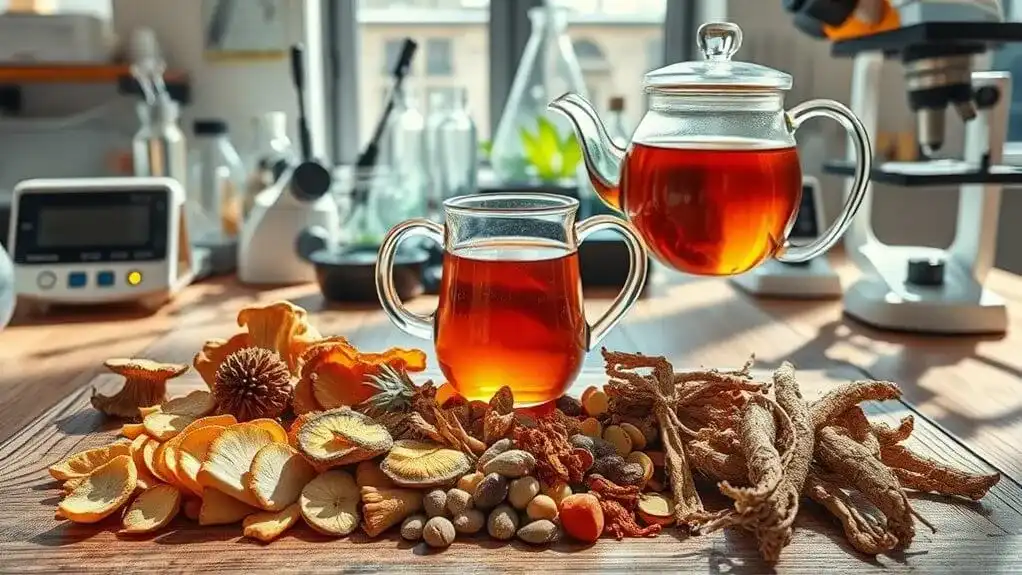
While many modern wellness trends come and go, adaptogenic herbs have stood the test of time, with roots reaching back to 3000 BCE in Traditional Chinese Medicine and Ayurvedic practices. These ancient practices documented powerful herbs like Asian Ginseng, Reishi, and Holy Basil in foundational texts such as the Shennong Herbal and Charaka Samhita.
The term "adaptogen" wasn't coined until the 1940s by Soviet scientists, but herbal traditions spanning multiple cultures had long recognized these plants' unique abilities. From Chinese emperors reserving Reishi for royal use to Vikings relying on Rhodiola for strength, these herbs played significant roles across civilizations. Modern science has since validated what ancient healers knew: adaptogens help the body cope with stress, maintain balance, and support overall health when properly standardized and manufactured. These herbs are particularly effective because they provide sustained energy without crashes, unlike common stimulants such as sugar and caffeine. Today, these powerful herbs work by supporting the HPA axis function, which helps regulate the body's response to various stressors. Clinical studies in the 1950s revealed that Eleuthero as adaptogen led to extensive research into these remarkable plants.
The Science Behind Stress Response and Adaptogenic Effects
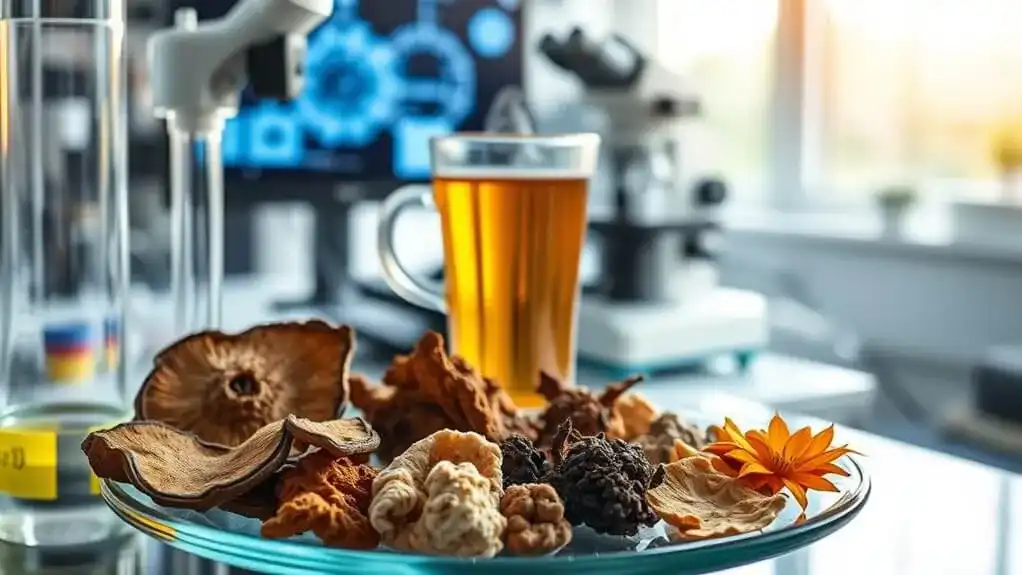
Before understanding how adaptogens work, it is crucial to grasp the intricate biological systems involved in the stress response. The body's stress physiology operates through two main pathways: the rapid sympathetic nervous system and the slower hormonal HPA axis. When stressed, these systems trigger the release of hormones like cortisol and epinephrine, causing increased heart rate and alertness.
The complexity lies in the neural circuits involved. The brain's stress response network includes the hypothalamus, amygdala, and prefrontal cortex, which work together to process and respond to stressors. Recent research has shown that the integrated stress response plays a vital role in helping cells adapt to various environmental pressures and maintain homeostasis. While adaptogens claim to help manage these responses, research shows the challenge in validating their effectiveness. The interaction between various brain regions and hormonal systems makes it difficult to prove how these herbs might influence such complex biological mechanisms. With over 1,500 Soviet studies conducted during WWII, the scientific foundation for adaptogenic effects remains questionable due to outdated research methods and poor standardization.
Common Adaptogenic Herbs in Tea Blends: Evidence-Based Benefits

Although adaptogenic herbs have been used for centuries in traditional medicine, modern research has begun validating their therapeutic properties in tea blends. Studies show Tulsi benefits extend beyond stress relief, demonstrating effectiveness in fighting infections and improving skin health. When combined with licorice root, it creates powerful synergistic effects in blends like Beauty Tea and Inner Clarity. Twinings' Inner Clarity blend showcases rich minty flavors from the Tulsi herb. Russian scientists made groundbreaking adaptogen discoveries during World War II.
Research particularly supports Ashwagandha effects on stress reduction through measurable decreases in cortisol levels. A recent double-blind study revealed 23% lower cortisol in participants taking ashwagandha extract. This adaptogen improves cognitive function, sleep quality, and physical performance while reducing inflammation. Similarly, Ginseng and Jiaogulan work together in Immortal Tea to boost energy and manage anxiety without causing jitters. For best results, it is crucial to start with small doses, follow proper steeping guidelines, and source high-quality ingredients from trusted suppliers.
Clinical Research and Safety Considerations
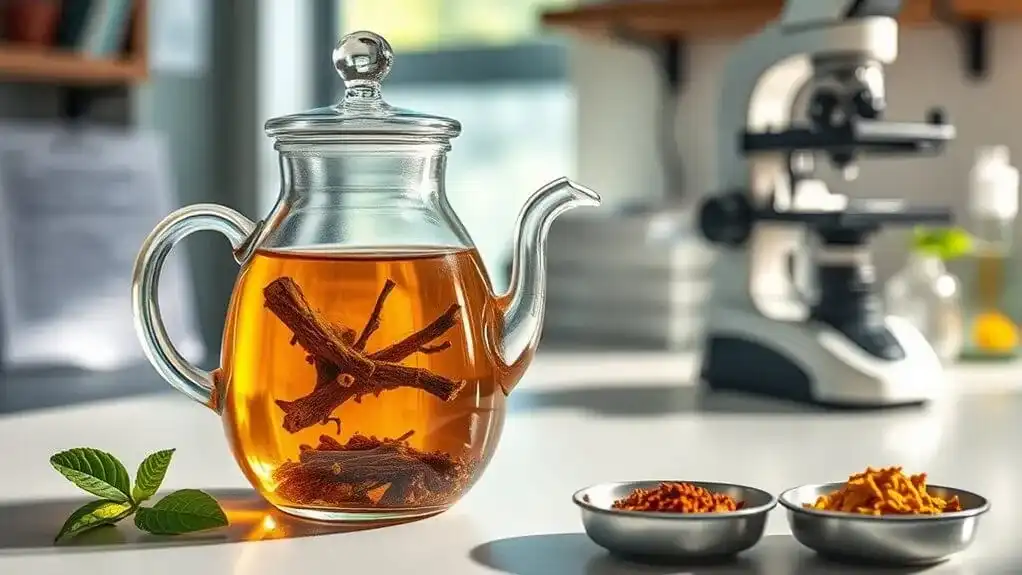
Since adaptogens have gained popularity in modern wellness circles, scientific research has revealed important safety considerations alongside their potential benefits. Clinical studies show adaptogen interactions with medications, particularly antihypertensives and immunosuppressants, require careful monitoring. Safety guidelines emphasize caution for individuals with autoimmune conditions, as herbs like astragalus may stimulate immune responses. While adaptogenic mushrooms help reduce physical and mental stress responses, their effects require more validation through research. L-theanine in tea provides a uniquely balanced way to manage stress response compared to other adaptogens. Traditional medicine systems like Ayurveda and Chinese medicine have long recognized these herbs' stress-adaptive properties.
Research confirms adaptogens' stress-reducing properties through regulation of the hypothalamic-pituitary-adrenal axis, while combinations like ADAPT-232 show promise for cognitive function. However, potential side effects include fatigue, headaches, and in rare cases, liver toxicity. Pregnant and breastfeeding women should avoid certain adaptogens, especially ashwagandha. While standardized preparations offer more reliable dosing, more human clinical trials are needed to establish thorough safety protocols and validate therapeutic applications.
Market Analysis: Separating Genuine Products From False Claims

As the adaptogenic beverage market surges beyond $1.3 billion, consumers face increasing challenges in distinguishing authentic products from misleading alternatives. Market trends indicate that while ashwagandha dominates ingredient choices, not all products meet quality standards. Companies like REBBL and Califia Farms are leading innovation with new adaptogenic product launches. Quality manufacturers like Child's Pose Tea demonstrate authenticity through their use of sacred herbs and documented benefits. Japanese matcha green tea has emerged as a leading adaptogenic option due to its proven ability to provide balanced energy levels.
Genuine adaptogenic beverages showcase transparency in their ingredient sourcing and manufacturing processes, backed by third-party testing and regulatory compliance. Current consumer preferences lean towards natural, stress-relieving solutions, particularly in ready-to-drink formats that account for 44% of market share. However, buyers should be wary of products making unsubstantiated health claims or those containing synthetic additives masked as "natural flavors." To identify authentic products, consumers should look for clear ingredient listings, documented adaptogenic herbs, and verifiable third-party testing results from reputable manufacturers.
Best Practices for Incorporating Adaptogenic Teas Into Daily Wellness
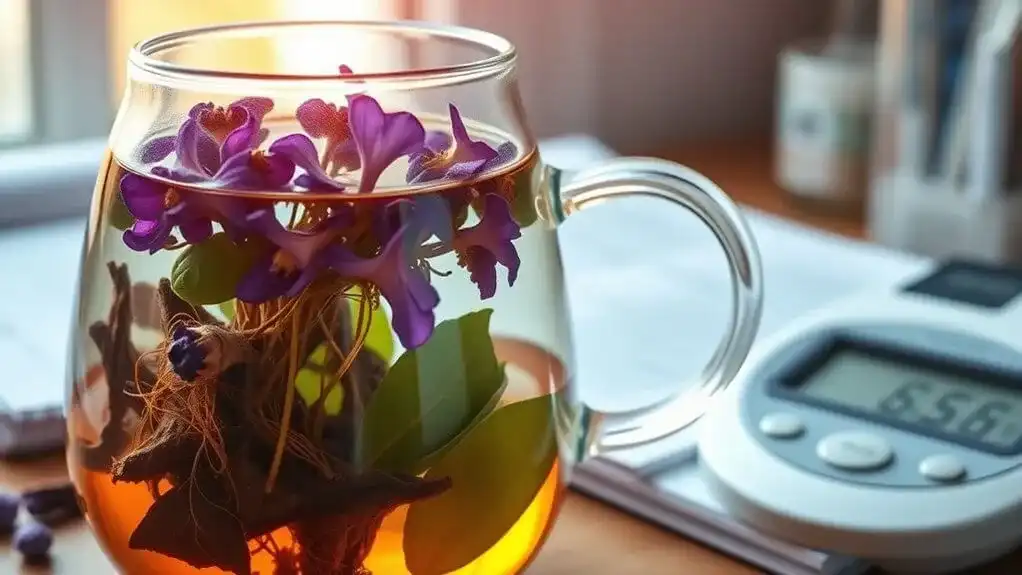
While adaptogenic teas offer numerous health benefits, their effectiveness depends heavily on proper integration into daily wellness routines. Success lies in establishing consistent daily rituals that incorporate mindful sipping practices and proper timing of consumption. Starting with small amounts and gradually increasing intake allows the body to adjust while monitoring any potential effects. Consulting with medical professionals first helps ensure safe consumption, especially for those taking prescription medications.
For best results, it is crucial to select high-quality teas from reputable suppliers and choose blends that align with specific wellness goals. Morning consumption typically works best for energy-boosting varieties, while calming blends are more suitable for evening use. Combining adaptogenic tea consumption with other healthy lifestyle practices, such as regular exercise and adequate sleep, creates a synergistic effect that maximizes their stress-reducing and immune-supporting properties.
Conclusion
While adaptogenic herbs show promising stress-reduction benefits, only 2% of commercial adaptogenic tea products have undergone rigorous third-party testing to verify their claims. Today's wellness consumer needs to balance traditional wisdom with scientific evidence when choosing adaptogenic teas. Understanding both the research behind these botanicals and current market realities helps people make informed decisions about incorporating these ancient remedies into modern self-care routines.
